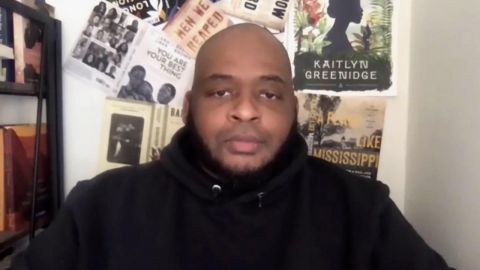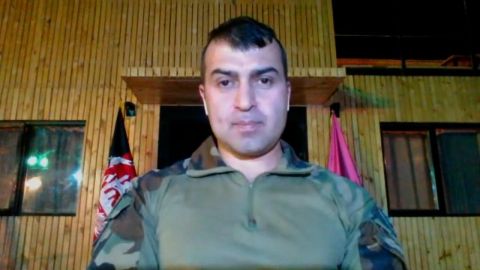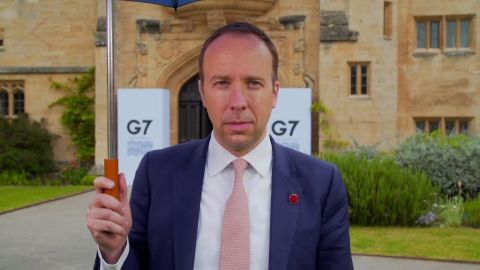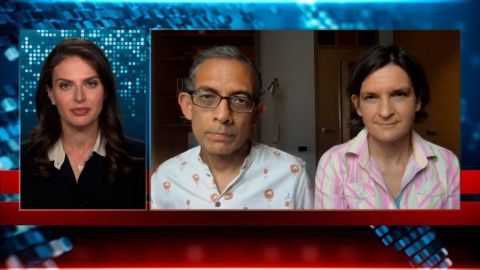Read Transcript EXPAND
BIANNA GOLODRYGA: Well, now we sometimes hear of artists selling the rights to their work, but rarely of them doing the opposite, buying those rights back. Well, this
is exactly what our next guest, the award-winning author and professor, Kiese Laymon, has done. He is rereleasing two books eight years books after
their original publication. One is his debut novel, “Long Division,” and another is his best-selling collection of essays with the stark title “How
to Slowly Kill Yourselves and Others in America.” Here he is talking to Michel Martin.
(BEGIN VIDEO CLIP)
MICHEL MARTIN: Thanks, Bianna. Kiese Laymon, thank you so much for talking to us again.
KIESE LAYMON, AUTHOR, “LONG DIVISION”: Thank you so much, Michel, for having me today.
MARTIN: Your memoir, “Heavy” was such a powerful work, won many awards and you’ve got these two books now which have just come out and I am realizing
that, you know, reading them, you actually published then back in 2013. I’m talking about your book of essays, “How to Slowly Kill Yourself and Others
in America,” and your novel, “Long Division.”
They were published in 2013 but you bought the rights back and republished them. And I know that it sounds kind of like “Inside Baseball” but it’s
obviously so important to you. I have to ask you, why it was so important to you to do that?
LAYMON: It was so important for me to do that during last year particularly because death was around me and my students were dying, I
assumed my grandmother was going to die, I assumed I was going to die, and I just started to think about lineage. I wanted the art that I created to
be out in the world the way I longed for it to be out.
Initially, when I through publishing of independent press out of Illinois, I didn’t publish those books the way I wanted. And even if I had published
them the way I want it, I had eight years in between to go back and re- think and revise. And I think that this year has taught us, hopefully, the importance of revision. So, I wanted to model that for myself and also, I
just wanted to put the art out there in the world that was going to live longer than me because I wasn’t sure that I was going to make it.
MARTIN: May I say, your grandmother did make it. If it’s OK of saying that. And so, we’re grateful for that. And revision. Why is revision so
important? Revision isn’t just ending in your description and your understanding. Revision is so much bigger than that. Why is it so much
important to revise?
LAYMON: One, I’m a teacher, I’m a writer, and I’m an American. And I think when you really look at the history of this country, particularly history
of black folks in the deep south, I think we see that revision and resistance to revision are the why of why we’re here.
And, you know, revision is religion to me. It’s a practice. It’s a practice that is anchored on like ethically reconsidering the ingredients of what
you created, be it in a relationship, a life, a piece of art and, you know, especially after the Trump presidency where this man pushed rigorously
against national, regional and interpersonal revision.
I wanted to double down on what got us here, and that is an assessment of how we got here and a re-thinking of what we can do to be better. I don’t
know about that word great, but I know we can always be better, but we cannot be better unless we honestly assess the past and that is what
revisionists means to me.
MARTIN: Well, those who — people who are familiar with your earlier work will know that you can be unsparing. I mean, unsparing of yourself as well
as unsparing of whatever the subject is that you’re writing about. And one of the things that really, how can I say, you are unsparing about is what
those early days of the pandemic were like. On the one hand, coronavirus unfolding. On the other hander connected, perhaps, social justice movements
unfolding. I mean, this has been —
LAYMON: No. Right.
MARTIN: So, how was that for you, tracing both those at once?
LAYMON: It was much more gentle and tender and evocative than it should have been because I sought out my elders. And that’s the thing about
everything — you know, part is because I come from Mississippi. You know, when I wrote “Long Division,” I sought out like Jewish elders and I sought
out like actually like black elder elders to talk about their experience as a young people. When I wrote “How to Slowly,” the revision of it, I needed
to talk to black folks who lived in Jackson who experienced literal, literal terror and civil rights in the ’60s and asked them what this looked
like to them.
You know, and when I interviewed some of them, and one of them told me that this is an awakening, but all awakenings have cost, and I just want all of
the young people to understand like the awakening has cost, but you are committed and you must never, ever, ever go back to sleep. That hit me in
my heart. You know, like — and this was also around the time Mississippi State flag was changing.
So, those groups of people who fought for like, you know, many changes were in some way not just grieving, but celebrating a victory while warning
young people that the backlash would be harder than anything they’ve ever experienced. And I knew that, but hearing older people say that in their
voices, some of them trembling with terror and some of them trembling with like joy, it just put me — it connected me again to that thing I’m always
trying to write to, if I’m going to be honest.
MARTIN: Well, some of your work is deeply personal about things that are not often spoken of — I’ll just say it in the African-American community,
of like the fraught relations that some of us have with our parents, particularly with our mothers, like there’s this image of the mother that
some of us have with our own bodies.
LAYMON: Yes.
MARTIN: That some of us have with our caretaking responsibilities. So, a lot of these things aren’t talked about in public. And I’m wondering what
this has been like for you to put all those messages out. And also, I must say, that a lot of times people put those messages out through fiction, but
you don’t.
LAYMON: Right.
MARTIN: You say, this is my stuff.
LAYMON: Right. Right. Right.
MARTIN: What does that mean?
LAYMON: That is a great question. You know, I mean, if I’m going to be honest, you know, and you somehow always make people want to be honest, I
think that word that you just described would be impossible if I did not see myself connected to a larger tradition.
You know, we talked earlier about George Floyd indirectly and the musician, Adia Victoria, was talking to me from weeks ago about watching the Floyd
trial and watching one of the experts on stage say, when George Floyd is like, you know, met — doing his fist like that, when the man’s knee is on
his neck, he’s trying to breathe.
And she connected that to the blues musicians, the gardeners, the plant workers in the rural south and all across the country who also were trying
to breathe through hands. And I understand how that is partially ableist, but I see myself connected to a larger tradition of people who have been
told, you cannot breathe. And we’re going to try breathe. We are going to breathe somehow or another.
You know, be it through blues, be it through the creation of community programs. And so, when I’m talking to people, hopefully, as honest as I
can, I think it would be work that I could not do if I only saw myself up there. I see myself up there, I see Fannie Lou Hamer up there. I’m not
trying to say I’m anywhere near Fannie Lou Hamer. I see Margot Everett (ph) up there. I see Margaret Walker Alexander. So, I see these people who have
been denied breath but who have found creative ways to the breath. And I just try to step into the shadow and breathe in my own way.
MARTIN: I’m thinking about this one — one of the essays in “How to Slowly Kill Yourself,” the book of essays where you write about Mississippi and
you write about some of the behavior of people who are now in leadership there, OK?
So, a lot of people. It’s like the governor. It’s not just — it’s the governor and his conduct as a student, it’s, you know, confederate statues,
it’s all of this stuff that is known locally but that perhaps doesn’t get into the national conversation, right?
LAYMON: Right.
MARTIN: But here’s a paragraph that stood out to me. You say, the worst of white folk will not be persuaded. They can only be beaten. And when they
are beaten, they fight more ferociously. They bruise us, they buy us. That is why we are so tired. That is why we are awaken. We are fighting an enemy
we showed exquisite grace, an enemy we’ve tried to educate, coddle and outrun, an enemy that never tires of killing itself just so it can watch us
die.
LAYMON: I wish that paragraph were not true. You know, at the root of the paragraph, is my grandmother — my mother always taught me, you have to be
twice as good as white people to get half as much. And what they didn’t teach me is that there’s a consequence to being twice as good.
And I think that what I’m trying to show in that paragraph is that never ever should we think that we are where we are because we have not done what
they told us to do, which is to be twice as good, not just educationally, but ethically. Be twice as good and committed to our “perceived
Christianity.”
And what I am trying to tell myself or remind myself, that in some way, though it’s not purely political, this is a political battle. These people
will not be persuaded. I mean, you beat these people and you pray for their children. You do not violently do anything to those folks. B
ut when people double down on telling you that they don’t care about themselves enough to harm themselves to harm you and your children, well,
you fight, you do direct action, you organize and you pray, if that is what you do, for those children. Because the children of these people deserve
more than what these parents are giving them, and that is something that we have been told over and over again as black people or black parents and
black children.
And I’m not just trying to invert the critique. But at some point, somebody has to ask the question, who is going tend to these white children in this
country? Who will tend to white children? You’ve been asking us to do it for centuries and we’ve done it, but we got to tend to ourselves as well.
And that’s what I’m trying to do with my art and that’s what I think a lot of us are trying to do right now. We get to history. We go to lineage. We
walk in that. We are tired of tending to people who won’t tend to their children.
MARTIN: You know, I am tempted to focus on your essays because, you know, as a journalist, they so speak to the moment, but I don’t want to neglect
your fiction. “Long Division” is so different. You tell us about it.
LAYMON: Yes. So, you know, “Long Division,” if you strip it down, is a story of how black children in Mississippi created — black children and
Jewish children creatively grieve across generations. You know, that’s what it is like on a major level. On the concrete level, it’s the story of one
teenager in Mississippi who is attempting to find himself via internet, via the internet celebrity. And there’s a story of another Mississippian, a
black girl named Baize who disappeared trying to find herself via her parents and writing.
So, both of these characters have, you know, different manifestation but they’re both trying to collectively grieve. They don’t know exactly what
they are trying attempting to creatively and collectively grieve, but they’re grieving. And I think the characters, including the reader, meet in
the middle of the book. I wanted to make this book a tactile group that you had it turn. It’s a workbook. You know what I mean? There’s true or false
questions, there’s essay, assignments in there.
Again, I wanted to push the genre of the American novel in ways I hadn’t necessarily seen while inviting people to the table who hadn’t been
invited.
MARTIN: A lot of your writing speaks to living in the white gaze?
LAYMON: Right.
MARTIN: And navigating your understanding and attempt to find out who you are but to try to figure out who you are while navigating the knowledge
that you are always going to be looked at.
LAYMON: Yes.
MARTIN: And that you have to negotiate how you are looked at, right?
LAYMON: Yes. Yes.
MARTIN: And so, given that that’s such an important topic of yours, how did you think about that when you were creating your characters for your
novel? Do they care that they’re being looked at? I mean, and how do you feel about that?
LAYMON: They absolutely care. But as young teenagers, they’re just becoming aware of the different gazes, right? And they’re not sure why
certain perceptively mediocre gazes dictate so much. Do you know what I’m saying?
MARTIN: Right.
LAYMON: And so, what I’m trying to show in this book is that, yes, black people writ large and black folk in the deep south, we have to move through
this world being watched. But that’s not the problem, the problem is that we’re being watched and disciplined by people who do not fairly watch
themselves or discipline themselves. Do you understand what I’m saying?
MARTIN: Yes.
LAYMON: And so, like my — this book, though it was written in the pre- Trump era, is completely talking specifically to like the creation of Donald Trump, the creation of people who would put a man in an office who
says, I want to sexually assault, to brag about that, and then we are supposed to believe these people and have these people’s gaze and dictate
so much about what we do morally and what our children do morally when they’ve done something we would never do.
We would — no matter what you say about black folks in this country, I don’t care if it was some person that was running reparations, we would
never put a person as a president of the United States/earth who said out loud, I want to sexually assault and grab women by their privacies.
Now, the majority of white Americans and the majority of white Christians in this country have done that. So, what we have to do is think about what
does that to our children. We have to beat these people politically but we also have to take care of their children because that’s something that they
have not done.
And as a teacher, sadly, that work can gets tiresome. And sometimes, when I’m taking care of white children, I’m not taking care of the child inside
my heart, I’m not taking care of black children. We don’t just have to deal with just their eyes, we have to deal with their lack of ethics and their
perceived lack of morality and then we have to help raise their children.
The sad part is that exactly what my grandmother had to do, and then my mom. And now, sadly, I’m asked to do that. And sometimes, I don’t want to
do that. I want to tend to my heart. I want to tend to our heart. I want to deal with like our — as a way we harm ourselves, it’s hard to do that when
these people have doubled down on despicable and forsaken their own children while going after ours. It’s just hard to do it. But you know
what? This is our lineage and this is what we do.
MARTIN: We were talking about your grandmother earlier. You were saying that she doesn’t have hope now, but she does have faith.
LAYMON: Yes.
MARTIN: Would you mind telling me a little bit more about that?
LAYMON: I think when you are critical of whiteness in this country, people want to ask if you have hope in whiteness. And whenever I get the question,
I say, categorically, I have faith. I have faith that we are going to this right. And primarily, I have faith that black Americans are going to be
better, right? And my grandmother is sort of like the model for that. You know, whether she has hope or not. You know, she’s a Cristian. She believes
die hard in her Jesus. And her Jesus is not a hopeful Jesus. Her Jesus is a faithful Jesus.
And so, you know, she’s been alive 92 years. And when she tells me last year that she’s never seen it as bad as it is now, that’s brutal to hear
for someone who grew up in Jim Crow Mississippi in 1929. But as bad as it is, for her, the day that she realized it was the worst is when Trump
walked with that bible — backwards bible and put the National Guard on those peaceful protesters.
And so, for my grandmother, she was like, it’s not that man, it’s that all of these people think that what that man did is OK. I’ve never seen it like
that, but I have faith that we are going to push through and be better today than we were tomorrow, and I think that that faith, whether you root
it in like Christianity, when in Buddhism or Islam for folks in this country, that faith is partially why we got here.
And I’m never going to leave — I’m never going to give up that faith even if I know it makes no sense to have hope in the worst of white folks
changing. I’m going to have faith that the best of all of us will get better. I do have that faith.
MARTIN: Before I let you go, what I want to talk about a subject that you also return to, which is love. You say many times throughout the text that
you want people to learn how to love again and you want to teach yourself how to love again. You want to love again, particularly in regard to
family. Do you want to talk a little bit about that?
LAYMON: I know at the root of what I want to do in this culture and in this world, like it’s revision, but it’s also a dynamic understanding of
what we can do if we commit to love as a practice, right? And I think love as a practice necessitates again talking with ourselves and to people we
report to love if we fail.
The problem in this country is, you know, empire, the problem in this country is poverty. But at the root, I think the problem in this country is
that we have not been collectively loved as young people and that we become adults who are tasked with loving, and we haven’t seen that model.
So, I just want to do what I can as an artist and as a human being to model a different kind of radical love that pushes outside the bounds, especially
if those bounds are like constricting and dehumanizing and broadens and makes — debates for more broading (ph). So, like, I want to be better at
loving the people I purport to love. I want to better at loving the things and the people I purport to love. Without that, I have no chance and I
don’t think we have a chance as people.
MARTIN: Kiese Laymon, it’s great talking with you. Thank you so much for talking with us today.
LAYMON: Thank you so much, Michel, for making space for me.
About This Episode EXPAND
Health ministers from the wealthiest countries are meeting today in Oxford to address vaccine inequality.
LEARN MORE



